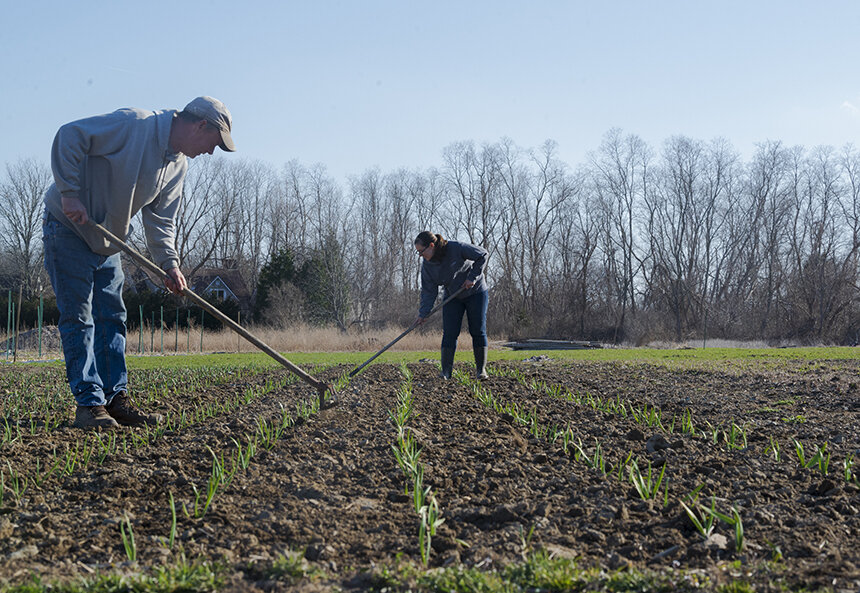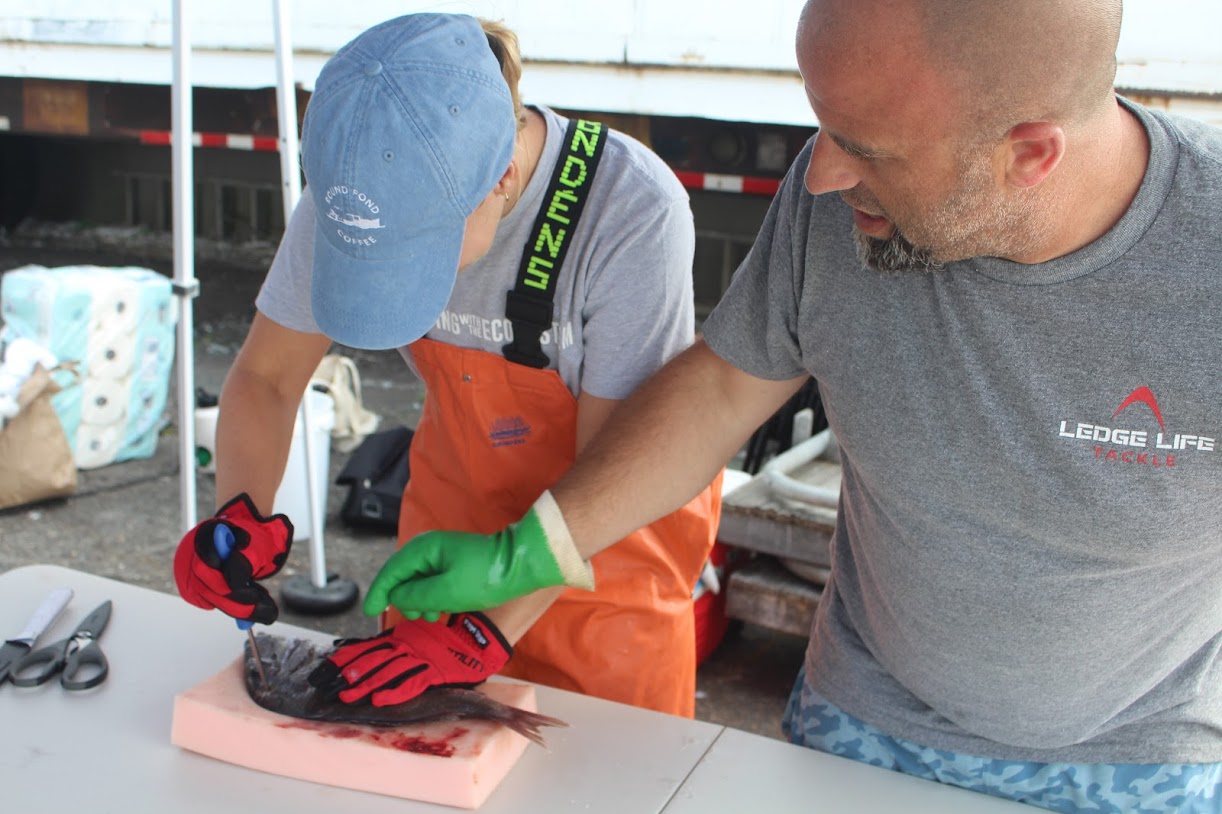Food Insecurity Strains Safety Nets as Outlook Worsens
April 11, 2020
The number of people seeking food assistance is up sharply across the state, with filings for the Supplemental Nutrition Assistance Program (SNAP) up 30 percent during the past month, according to the Rhode Island Department of Human Services (DHS).
The Rhode Island Community Food Bank says visitors to pantries are rationing SNAP benefits because of food shortages at home, and COVID-19 caregivers are struggling to feed their families. In one instance, an international student, with no family and no income, suddenly finds himself in need of food assistance.
The federal government has been slow to roll out a new program that increases SNAP benefits for families that typically receive free or reduced-cost meals from schools. The program, called Pandemic EBT, was filed by DHS on April 1 but the agency is still awaiting approval from the U.S. Department of Agriculture.
Local food pantries are serving an unprecedented number of the recent food insecure. Olivia Martinez, social services director of the West End Community Center Pantry in Providence, has seen the number of monthly visitors nearly triple from about 550 to 1,300.
“It’s a lot of people I’ve never seen in my 12 years here,” Martinez said. “It’s really, really busy.”
Like most food pantries, deliveries for seniors and the sick is at, or near, capacity. The West End Pantry is implementing physical distancing by offering grab-and-go bags of food and toiletries. Only one allotment is allowed per person, per month. But demand for food is so strong that many are returning for a second or third allotment, only to be turned away.
The state’s largest soup kitchen, Amos House in Providence, is preparing an additional 150 meals a day or about 4,500 more meals a month since the start of the pandemic. The kitchen staff has expanded to three shifts a day to keep up with demand for meals and shelter.
Until recently, Amos Home prepared meals — about 700 total — for homeless people quarantined at the Wyndham Providence Airport Hotel on Post Road in Warwick. Four classrooms at the Amos House community center on Pine Street have been converted to overnight shelters so that the homeless and unsheltered can maintain physical distancing overnight.
Food supplies have remained steady, for now, but the Amos House has made several changes to adapt to the public-health crisis. The kitchen and operations are run by employees only after the stable of volunteers was told to stay home for health concerns.
Leftover food from restaurants and grocery stores has slowed or stopped, as eateries close or reduce their hours. Grocery stores are donating less food as they struggle to keep their shelves stocked.
“Our food-recovery (network) has virtually ended,” Amos House executive director Eileen Hayes said.
With no sit-down service at the soup kitchen, spending has increased for supplies such as takeout containers and disposable utensils and cups. The sudden need for even more health and sanitizing items such as cleaners and masks is also draining expenses.
Hayes said the demand for food services was growing before the novel virus hit, as jobs at the low end of the pay scale became scarcer. She anticipates that the need for food services will not abate once the health crisis is contained, as many struggle to find housing and pay rent.
“We’re just holding our breath,” Hayes said. “The bottom has fallen out and it continues to fall.”
The Dr. Martin Luther King Community Center in Newport experienced a trial run for the pandemic during the natural gas outage in January 2019. For nearly a week, the community center delivered food to many struggling without heat.
The center’s food pantry and mobile food truck pantry recently served 1,018 people in a single week, a quarter of the people it served all of last year.
“We’ve seen a huge spike,” said Heather Strout, executive director of the nonprofit that serves Newport County.
Strout noted that many of the newly unemployed previously worked in the restaurant and hotel industry, two sectors decimated by the coronavirus pandemic.
“Many live paycheck to paycheck in that industry and when one of those paychecks doesn’t come in, it’s devastating,” she said.
The center promotes nutrition by providing fresh produce and local dairy products. When the crisis began in early March, the center gleaned produce from restaurants for their pantry. Local grocery stores continue to offer produce, along with deliveries from the Rhode Island Community Food Bank.
Strout shares the view that the economy won’t simply return to full strength when the public-health crisis diminishes. She expects that the recently laidoff will be needing food assistance for months, perhaps years.
Meals on Wheels of Rhode Island has seen its daily meal deliveries increase from 1,200 to 3,700 a day. The service has met the surge with federal funding and an influx of volunteers. The home-delivered meal program attributes the increase in demand to restaurant closures, directives to stay at home, and fewer caregivers assisting the 60-and-older population.
The Salvation Army has been in disaster mode since March 14 at its three Rhode Island food pantries and two meal sites. Food supplies are sufficient to meet demand, but some staples are dwindling such as ground beef, canned vegetables, peanut butter, rice, and even brown paper bags.
“It’s a challenge right now,” said Major Roger E. Duperree, Jr., divisional secretary for Salvation Army Rhode Island.
Providence is experiencing new pockets of needs as part of “a magnification of food insecurities that already exists in Rhode Island,” said Ellen Cynar, the city’s director of healthy communities.
Cynar doesn’t know yet how many people are seeking food assistance for the first time. But she said many “people who were never food insecure are running out of savings and, of course, can’t look for a new job.”
One challenge for food pantries and distribution centers has been the loss of the safety net of volunteers, most over the age 60, who fulfill myriad daily tasks. While this unpaid workforce stays at home to limit exposure to COVID-19, the city of Providence has recruited a new batch of volunteers to fulfill short-term needs on short notice, such as unpacking pallets of donated food or assisting with deliveries to senior apartment buildings.
The city’s public school department has adjusted to the demand for food and increased physical distancing by launching its summer food service program three months early. The city provides meals to all students without payment. But what used to be a social experience was altered to discourages congregating. Food pickup is offered twice a week and only one student is allowed in the school or distribution center at a time.
“It has really changed the way we set up distribution,” Cynar said.
Local businesses and organizations are helping. In Providence, the Hudson Street Deli is running a fundraising campaign that provides meals for the food insecure, pays staff, and keep its doors open.
The new textile collection service, Curbside Textile Recycling LLC, based in Warwick, is collecting nonperishable food for distribution, along with its curbside collection of used clothing and shoes.
Rhode Island Pride, the LGBTQIA+ awareness group, is running an emergency supply drive for the food insecure.
Public-private partnerships are also bringing additional food to those in need. Brown University is donating 200 packages of food a week — equal to about 3,000 meals — to food centers at the Dorcas International Institute of Rhode Island and the Mathewson Street United Methodist Church in Providence.
Food companies Chobani and Edesia Inc., based in North Kingstown, are donating yogurt and ready-to-eat meal packs for grab-and-go meals for Providence youth.
Not all food facilities are open. Some senior centers, farmers markets, and other sources of food assistance have closed because of the pandemic.
The SNAP program was nearly dealt a blow on April 1, when a rule imposed by the Trump administration would have cut benefits for 700,000 participants, including 7,000 in Rhode Island. But last month, a U.S. District Court Judge for Washington, D.C., paused the action after a civil suit by U.S. attorneys general, including Rhode Island Attorney General Peter Neronha. The U.S. Department of Agriculture is appealing the decision and the rule may yet take effect.
DHS has taken steps to improve food access by creating a website, called RI Delivers, showing delivery services. Many of the delivery organizations, however, are backlogged with orders. Most charge for shipping and none accept the SNAP payment card, known as the EBT card.
Recipients of SNAP and WIC, the federal Supplemental Nutrition Program for Women, Infants, and Children, are allowed to have a third party shop for groceries on their behalf and pay with the EBT card. But with a state shelter-in-place order, finding a surrogate or the needed food isn’t always possible.
DHS is working with the federal Food and Nutrition Service to remove restrictions, such as allowing delivery drivers to provide point-of-sale service and process EBT cards. DHS is also pushing for: online shopping for SNAP recipients; new SNAP recipients to submit applications over the phone and use a voice attachment as a signature; and expanding the number of eateries in the state restaurant meals program (currently, nine Subway shops in Rhode Island serve elderly, disabled, and homeless SNAP recipients).
In March, DHS increased benefit amounts for some SNAP households and extended deadlines for SNAP recertification in March, April, and May.
Meanwhile, other organizations are making it easier to access food. The Rhode Island Food Policy Council recently created an online map that shows in-state emergency and supplemental food sites, such as pantries, senior meal sites, SNAP retailers, WIC vendors, and school meal pickup sites.
“This map is a new resource for the state at a time when we anticipate there are a lot more people who may be losing their jobs and in need of food assistance,” said Nessa Richman, network director for the Rhode Island Food Policy Council.
The Rhode Island Department of Environmental Management recently launched a website listing home delivery and pickup services, farmers markets, and farm stands. A second website catalogs seafood retailers, markets, and restaurants.
The Rhode Island Community Food Bank maintains an updated list of days, hours, and locations of all Rhode Island food pantries and meal sites.
All community groups welcome volunteers, but they prefer support through direct donations to address their most urgent needs.



